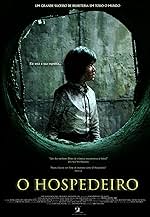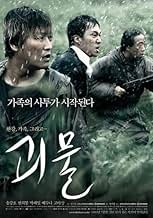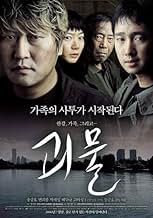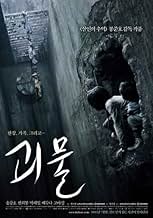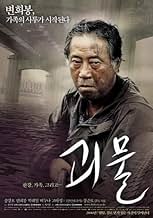Un mostro emerge dal fiume Han di Seoul e inizia ad attaccare le persone. La famiglia amorevole di una vittima fa il possibile per salvarla dalle sue grinfie.Un mostro emerge dal fiume Han di Seoul e inizia ad attaccare le persone. La famiglia amorevole di una vittima fa il possibile per salvarla dalle sue grinfie.Un mostro emerge dal fiume Han di Seoul e inizia ad attaccare le persone. La famiglia amorevole di una vittima fa il possibile per salvarla dalle sue grinfie.
- Premi
- 29 vittorie e 36 candidature
Byun Hee-Bong
- Park Hie-bong
- (as Byun Hee-bong)
Bae Doona
- Park Nam-Joo
- (as Bae Doo-na)
Oh Dal-su
- The Monster
- (voce)
- (as Dal-su Oh)
Lee Jae-eung
- Se-jin
- (as Jae-eung Lee)
Pil-sung Yim
- Fat Guevara
- (as Pil-Sung Yim)
Kim Roe-ha
- Hazmat Suit Man at Funeral
- (as Roe-ha Kim)
Yu Yeon-su
- District officer Mr. Jo
- (as Yeon-su Yu)
Go Su-hee
- Hostage nurse
- (as Su-hee Go)
Brian Rhee
- Young Korean Doctor
- (as Brian Lee)
Trama
Lo sapevi?
- QuizCo-Writer and Director Bong Joon Ho and the designer of the creature nicknamed it Steve Buscemi, based on the actor's screen persona and the way he acted in Fargo (1996).
- BlooperThe sewage they are searching the monster in, is dry and clean.
- Citazioni
Park Gang-Du: Let's have a cold one. Here.
[He hands Hyun-seo a can of beer]
Park Hyun-seo: This is alcohol.
Park Gang-Du: Well, you're in middle school now.
- Curiosità sui creditiJust before the credits ends, you can hear a loud roar of the monster.
- Versioni alternativeThere are two versions in circulation, the worldwide theatrical release, and another, edited cut available in Croatia. Runtines are, respectively, "2h (120 min)" and "1h 50m (110 min) (DVD) (Croatia)".
Recensione in evidenza
"The Host" is as deceptive and intriguing as its title (there's currently a 6-page thread in the discussion board and we still haven't figured it out). The movie can be taken as a straightforward monster flick, a dark comedy, a sentimental drama, or a rich socio-political allegory.
For the sake of this review, let's approach it as more than an action/comedy/horror flick, and let's assume it's a deeper allegory. There's definitely a lot of symbolism, lots of cultural references and outright satire for you to munch on. I think that's what makes this seemingly-ordinary monster flick into a powerful film.
Right in the first scene, the director sets the tone with a caricature of Western (U.S.) muddling. Like the excellent Korean film "Welcome to Dongmakgol" released a year earlier, this film is not exactly complimentary toward America, so if that irritates you, you might want to skip this. But when you consider all the 80s Hollywood flicks that painted Russia as a villain, I guess it's fair enough that the USA should take its lumps.
(I did want to add that the director takes a diplomatic approach, mocking the American "establishment" while indirectly praising the American individual. He does this by including an American tourist who's really cool. So in other words, his criticisms are not one-sided.)
The plot is two-dimensional but the symbolic implications are profound. The story is about a monster that terrorizes the banks of the Han River and grabs a young girl, prompting her bumbling family to lead a rescue effort, with no help from the Korean authorities. Some say that the monster represents Western imperialism. It could represent a figurative "attack" on Korean culture, autonomy and sovereignty. Or it could even be taken literally to represent environmental terrors caused by American apathy.
Don't worry, the USA isn't the only target here. There are some pretty good jabs at the Korean authorities too, insinuating (in a way that's both entertaining and irritating) that the Korean government is apathetic & hopeless. "So much for Korea's new democracy," says one character at one point in the film. Some critics point out interesting parallels & allusions to the 1980 Gwangju Uprising (where the Korean Government botched the whole situation, killing & wounding hundreds at a student protest). Everyone is fair game in a dark satire like this. In that respect it reminded me of the excellent Veerhoven scifi satires "Starship Troopers" and "Robocop".
Like all good satires, there's a nice amount of comedy to remind us not to take everything at face value. The bumbling family provides some great laughs in the first half, and certain scenes in the hospital are reminiscent of the sarcastic masterpiece "Brazil" with its merciless mockery of all institutional powers. The scene where they're looking for a virus in a guy's head is both riotously hilarious and profoundly disturbing.
I did want to mention one thing in case you're wondering. No, the audience isn't supposed to feel sympathy for the monster, not like in "King Kong". I was actually surprised at that (in a good way), because the director didn't stray from his message with any gratuitous sentimentality. Normally I'm not a fan of killer animal flicks (Jaws, etc) because I usually find myself siding with the animals more readily than the humans. But this film managed to avoid all sympathies, since the monster itself is a product of human idiocy (which is explained in the first scene).
Well I've just thrown a bunch of ideas at you, and I don't claim any of them to be absolute. But the point is that this seemingly-ordinary horror flick is so much more. It's entirely up to you how you want to see it. Like I said up front, you can just see it as a straightforward monster flick, but I think if you read deeper into the parallels with current Korean society, you'll get a whole lot more out of this.
For the sake of this review, let's approach it as more than an action/comedy/horror flick, and let's assume it's a deeper allegory. There's definitely a lot of symbolism, lots of cultural references and outright satire for you to munch on. I think that's what makes this seemingly-ordinary monster flick into a powerful film.
Right in the first scene, the director sets the tone with a caricature of Western (U.S.) muddling. Like the excellent Korean film "Welcome to Dongmakgol" released a year earlier, this film is not exactly complimentary toward America, so if that irritates you, you might want to skip this. But when you consider all the 80s Hollywood flicks that painted Russia as a villain, I guess it's fair enough that the USA should take its lumps.
(I did want to add that the director takes a diplomatic approach, mocking the American "establishment" while indirectly praising the American individual. He does this by including an American tourist who's really cool. So in other words, his criticisms are not one-sided.)
The plot is two-dimensional but the symbolic implications are profound. The story is about a monster that terrorizes the banks of the Han River and grabs a young girl, prompting her bumbling family to lead a rescue effort, with no help from the Korean authorities. Some say that the monster represents Western imperialism. It could represent a figurative "attack" on Korean culture, autonomy and sovereignty. Or it could even be taken literally to represent environmental terrors caused by American apathy.
Don't worry, the USA isn't the only target here. There are some pretty good jabs at the Korean authorities too, insinuating (in a way that's both entertaining and irritating) that the Korean government is apathetic & hopeless. "So much for Korea's new democracy," says one character at one point in the film. Some critics point out interesting parallels & allusions to the 1980 Gwangju Uprising (where the Korean Government botched the whole situation, killing & wounding hundreds at a student protest). Everyone is fair game in a dark satire like this. In that respect it reminded me of the excellent Veerhoven scifi satires "Starship Troopers" and "Robocop".
Like all good satires, there's a nice amount of comedy to remind us not to take everything at face value. The bumbling family provides some great laughs in the first half, and certain scenes in the hospital are reminiscent of the sarcastic masterpiece "Brazil" with its merciless mockery of all institutional powers. The scene where they're looking for a virus in a guy's head is both riotously hilarious and profoundly disturbing.
I did want to mention one thing in case you're wondering. No, the audience isn't supposed to feel sympathy for the monster, not like in "King Kong". I was actually surprised at that (in a good way), because the director didn't stray from his message with any gratuitous sentimentality. Normally I'm not a fan of killer animal flicks (Jaws, etc) because I usually find myself siding with the animals more readily than the humans. But this film managed to avoid all sympathies, since the monster itself is a product of human idiocy (which is explained in the first scene).
Well I've just thrown a bunch of ideas at you, and I don't claim any of them to be absolute. But the point is that this seemingly-ordinary horror flick is so much more. It's entirely up to you how you want to see it. Like I said up front, you can just see it as a straightforward monster flick, but I think if you read deeper into the parallels with current Korean society, you'll get a whole lot more out of this.
I più visti
Accedi per valutare e creare un elenco di titoli salvati per ottenere consigli personalizzati
- How long is The Host?Powered by Alexa
Dettagli
- Data di uscita
- Paesi di origine
- Siti ufficiali
- Lingue
- Celebre anche come
- Monster
- Luoghi delle riprese
- Aziende produttrici
- Vedi altri crediti dell’azienda su IMDbPro
Botteghino
- Budget
- 12.215.500.000 KRW (previsto)
- Lordo Stati Uniti e Canada
- 2.201.923 USD
- Fine settimana di apertura Stati Uniti e Canada
- 320.000 USD
- 11 mar 2007
- Lordo in tutto il mondo
- 89.433.506 USD
- Tempo di esecuzione2 ore
- Colore
- Mix di suoni
- Proporzioni
- 1.85 : 1
Contribuisci a questa pagina
Suggerisci una modifica o aggiungi i contenuti mancanti








